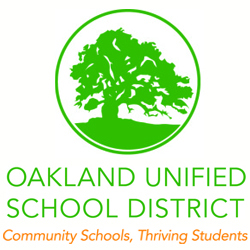
Last month, the Mills-based Educating for Democracy in the Digital Age (EDDA) initiative received a grant from the Thomas J. Long Foundation to contribute to the organization’s work with community education in Oakland high schools.
EDDA was founded three years ago as a way for the Mills School of Education to give back to the youth of Oakland. The core objectives of this organization are to integrate digital literacy and community issues into classroom curriculum, giving high schoolers the tools to make change and give back to their community through digital media such as blogging, photography and film. Though EDDA has been doing a great deal of work in Oakland high Schools already, this $150,000 grant will allow the organization to extend its reach and intensify its efforts across the the city.
Since its implementation, EDDA has grown to encompass 100 teachers at 11 high schools in the Oakland Unified School District.
Erica Hodgin, Associate Director of the Civic Engagement Research Group at Mills and co-principal investigator for EDDA, believes that this grant will help push the initiative beyond its planning phases and allow it to take hold at a more institutional level.
“The aim of the grant is [to] support the project to be institutionalized within Oakland Unified,” Hodgin said. “In this phase, the grant is enabling us to support some district staff to be able to integrate civic engagement and digital literacy into the curriculum, [and] helping to pay for teachers to develop curriculum and learning opportunities for students.”
The EDDA program is the first of its kind in Oakland for its emphasis on integrating community projects into the actual curriculum. The problem with existing civic education programs at high schools is that many are through clubs and after-school organizations, which not all students have the time or ability to attend. Making civic and digital education a part of the curriculum, Hodgin believes, will make community education and activism more accessible and produce young adults inspired and capable of making real change in their communities.
“Our aim is that all high school students have access and exposure to digital civil learning opportunities, so it’s not just the young people that have the chance to do it after school,” Hodgin said.
One of the primary aims of the initiative have been to introduce community readiness as a graduation requirement alongside college and career readiness. Even in these early years, a number of graduating seniors at Oakland high schools have been producing Community Ready projects at the end of their time at high school, addressing key issues in their communities such as gentrification and funding for public education using the skills they developed through EDDA programs.
Though the EDDA Initiative is led and run by Mills faculty and staff, as the program has expanded, students at the School of Education are being given more opportunities to get involved.
“We’ve been able to connect a lot of the student teachers [from Mills] with Oakland high school teachers that are part of our project,” Hodgin said.
Mills students are learning from their teacher mentors not only prescribed teaching methods, but many aspects of the new curriculum that EDDA hopes will one day be implemented throughout the country.
Joseph Kahne, Professor of Education at Mills and co-principal investigator, believes that the work being done at Mills could benefit students, especially those in urban communities, around the nation.
“There are a number of school districts that are doing work that’s related to this, but Oakland is one of the districts that’s made the most progress,” Kahne said. “We’re also doing a bit of work with folks in Chicago who are addressing some of these issues. I think we’d love to see it expand, especially since it seems to be working so well in Oakland.”
October also held another great stride for public education in Oakland, with the announcement of the integration of Ethnic Studies classes into all Oakland Unified School District high schools over the course of three years. Young Whan Choi, a Civic Engagement Coordinator for both the OUSD and EDDA, said in a statement to OaklandNorth that providing ethnic studies classes to high school students will lead to “higher overall academic achievement, boosts in social emotional learning, increases in self-efficacy, higher graduation rates, and a reduction in drop-out rates.” Alongside additions to the curriculum that will soon be brought about by the grant to EDDA, this curriculum change is hoped to raise educational standards in Oakland schools and inspire students to be leaders, activists, and engaged citizens in their community.
The EDDA initiative strives to set a standard for public education in the 21st century, and with this grant they are one step closer to extending the opportunity for high-quality education to students across Oakland.


